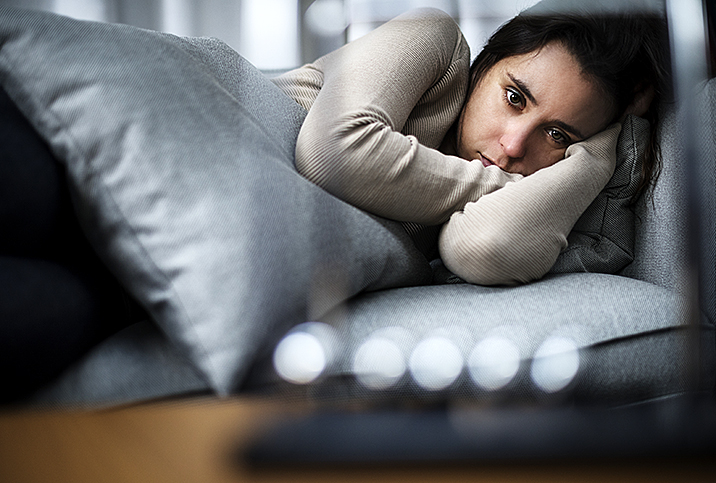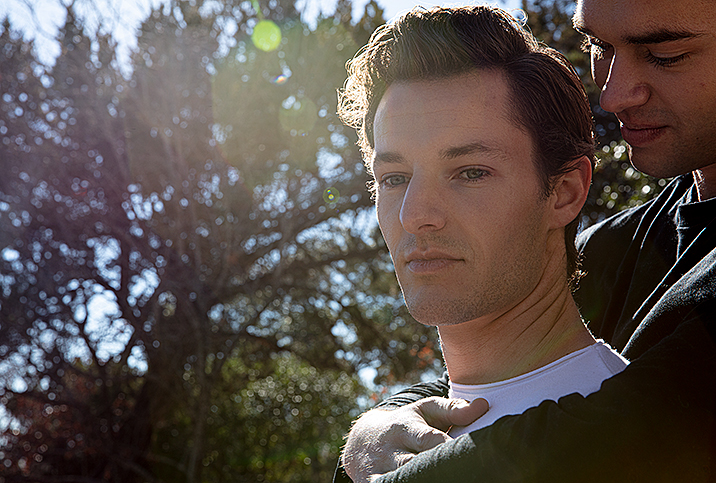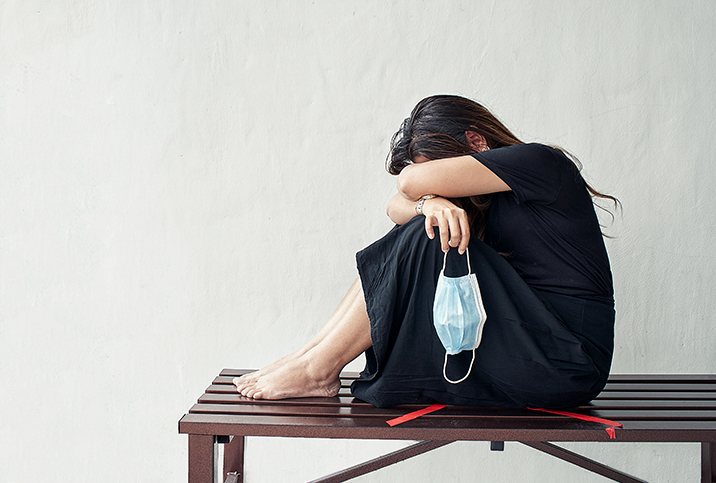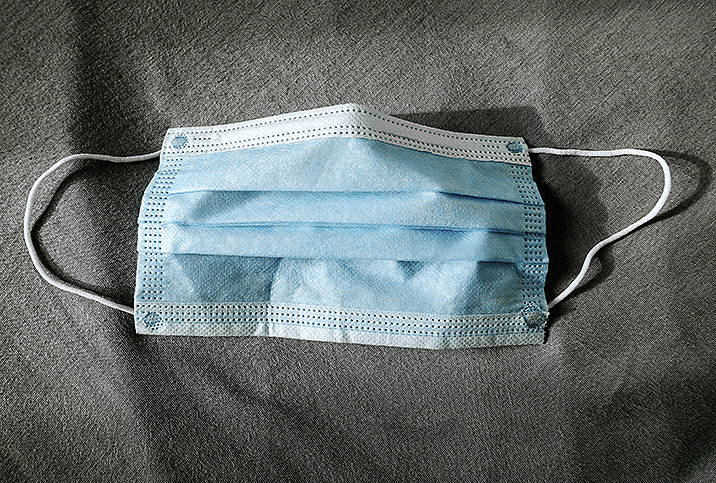The Real Reason COVID-19 Is Killing Your Marriage

It's been one hell of a year. With an unpredictable global pandemic that has taken more than 500,000 lives—not to mention all of the concurrent economic and emotional disruptions—it's no wonder more than 4 in 10 adults report they've experienced symptoms of depression or anxiety in the past year. That's up from 1 in 10 just a couple of years prior, according to February 2021 data from the Kaiser Family Foundation.
But when we refer to "depression," we're not talking about a tearful, "This Is Us"–episode type of sadness. Clinical depression, which the American Psychiatric Association defines as a serious medical illness that impacts your feelings, thoughts and actions, is a whole other level—and something many Americans are struggling with due to the pandemic.
"COVID-19 has many people very depressed and anxious, and that mood is, in most cases, a libido-killer," said Laurie Mintz, Ph.D., a professor at the University of Florida. Mintz is also a licensed psychologist and certified sex therapist in Gainesville, Florida, and the author of "A Tired Woman's Guide to Passionate Sex" and "Becoming Cliterate: Why Orgasm Equality Matters—And How To Get It."
And it's not just single people who are suffering.
"If you're quarantined with your partner and feeling stressed and depressed, time, interest and opportunities for sex are likely also going to take a nosedive," Mintz said. "This may be even worse for couples whose sex lives and relationships were already struggling, and such struggles may only be exacerbated when together 24/7."
So how exactly does depression impact your sex life?
Beyond the general lack of energy to indulge in once pleasurable activities, the symptoms of depression often cause sufferers to turn inward and self isolate, to feel lethargic and irritable and to have a greater tendency toward pessimistic thinking—none of which are very likely to make you want to jump under the sheets.
And depression often has a chemical component at play. Marla Renee Stewart, a sexpert for Lovers sexual wellness brand and retailer, explained that those suffering from depression usually have abnormally low levels of "happy hormones" such as serotonin, dopamine, oxytocin, and endorphins, which may stop them from engaging in intimacy. These hormones often trigger bonding feelings and compassion; without them, it can be hard to find the motivation to get intimate.
It's a Catch-22 situation: If the main hormones produced during sex are MIA in people with depression, making them less likely to desire intimacy, then they end up missing out on the potential mood boost that's offered by sex, said Heather Lyons, who is a licensed Ph.D. psychologist and owner of the Baltimore Therapy Group in Towson, Maryland.
It doesn't help that certain antidepressants can inhibit orgasm and sex drive, too, Mintz said. Prescriptions for antidepressants and anti-anxiety medications skyrocketed by 21 percent between February and March 2020 alone, as the pandemic was just beginning, according to a report by the online pharmacy company Express Scripts.
In many cases of depression, both the symptoms and the potential cure are adding height to the speed bumps that might line up between you and your bed. What a buzzkill.
What can be done to stoke your sex life?
"Not everyone will react similarly to depression in terms of their sex life," Mintz said, adding that no matter your situation, it's vital to remember that "both depression and sexual problems are solvable. Don't hesitate to find professional help."
Consider these pro tips:
- Go pro. Seek out a mental health professional who has experience with both depression and sexuality. Try telehealth for a pandemic-safe solution.
- Get the best Rx. If you are on antidepressants, call or email your prescribing physician about any potential sexual side effects—and the possibility of trying a medication with fewer side effects.
- Move it. Set aside time to exercise at home, which can help alleviate depression and enhance sex drive. Research proves that yoga is particularly helpful for both, according to Mintz.
- Love yourself. Try masturbating. Self-pleasure will produce some of those aforementioned happy hormones. Masturbation can also boost your immune system, potentially protecting you from illnesses like COVID-19, research indicates.
- Try toys. If it helps make sex more enticing, experiment with sexy additions to the bedroom such as lubricants or vibrators.
If you're not the one in the relationship suffering from depression, the most crucial detail is to not blame yourself or your partner.
"It can be easy to personalize a partner's loss of interest or performance difficulties, wondering if you're to blame," Lyons said. "And it's just as easy to become frustrated with your partner and point the finger in their direction. In reality, depression is an illness with both psychological and physiological causes and consequences. It is much more helpful for a couple to work together to fight depression."
If your partner is the one struggling, make an effort to listen and be supportive and avoid being pushy when they're not in the mood. "Ask how you can be supportive rather than making assumptions," Mintz said. "If they are in therapy, offer to go with them." If they’re OK with you being close to them, hugging or cuddling could be a beneficial way to give a slight boost to those feel-good hormones, Stewart said.
And don't turn off the potential to get turned on again.
"Psychologists and physicians often find that when depression and anxiety are treated, sexual functioning improves," Lyons said.
So even though your mood, and in turn your libido, may start to lift as COVID-19 vaccines help return the world to normal, why wait?
If you or someone you know has had thoughts of self-harm or suicide, contact the National Suicide Prevention Lifeline (1-800-273-8255), which provides 24/7, free, confidential support for people in distress.


















